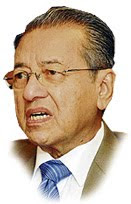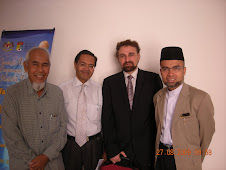Saturday May 16, 2009
Moving up the value chain
By JAGDEV SINGH SIDHU
AMIDST the strategies of trying to jump-start economic growth during the current recession, the Government has been drumming up talk and interest in trying to move the economy up the value chain.
In essence, the plan is to get the country into the list of high income economies and there have been more than a sprinkle of stories over the past few weeks to suggest that this push might be a little more than idle chatter.
“If we stand still during these dynamic times, we will be swiftly overtaken by our competitors, as we have overtaken others in the past,’’ says Minister in the Prime Minister’s Department Tan Sri Nor Mohamed Yakcop in a recent news report.
“We are at a critical point in time and failure to act today will have repercussions for many years ahead.’’
Economic history is full of countries that have stagnated and left behind by poor economic policies, overtaken by countries that have taken the initiative to move forward by leveraging on their strengths.
Today, we see countries in Asia, such as China and India, which are realising the potential of the size and strengths of their economies. Closer to home, Vietnam has catapulted itself as a viable base of operations for labour-intensive industries and eventually other more populous countries in the region would also do the same.
Recognising the need to move up the value chain is not new as former prime minister Tun Dr Mahathir Mohamad did so when he unveiled Vision 2020 in the early 1990s.
The points laid out under Vision 2020 was a blueprint for Malaysia to attain developed nation status. While the statistical number of hitting high economic growth of 7% per annum until the year 2020 was the headline number, the plan also called for the maturing of society and the pursuit of scientific progress.
The definition of developed nation varies and often includes a number of subjective factors such as human development. But according to the World Bank, a country is classified as high income once its gross national income per capita is US$11,456 or more and in Malaysia’s case, we are slightly more than halfway to match that mark.
Based on the World Bank’s criteria, 66 countries have attained high income status. In Asia, the countries that have passed that mark are Japan, South Korea, Singapore, Kuwait, Oman, Hong Kong, Taiwan, Bahrain, Qatar, United Arab Emirates, Saudi Arabia and Brunei.
To achieve developed nation status by 2020, an average of 7.5% economic growth per annum needs to be sustained from here on, Nor Mohamed says in the report, adding that this is only possible if the economy is re-energised towards higher income and growth trajectory.
“We cannot expect to be a high-income developed nation through incremental change. We need a model which is more relevant to current times.
“To move to a higher income-based economy, we have to move towards a knowledge and innovation-based economy where skilled labour is needed,’’ he says.
While the rhetoric on moving up the value chain has been laid on thick by politicians over the years, economists are not too optimistic of the country making the jump this time around.
“What we need is a holistic approach,’’ Maybank Investment Bank chief economist Suhaimi Illias tells StarBizWeek.
Suhaimi believes weaknesses in the economy, such as the country’s reliance on cheap foreign labour, need to be weeded out and improvements to the nation’s education system and skills training must be done before any effective move up the value chain can be made.
“The country must also start attracting investments with higher value added and the domestic skill set must be able to meet this higher demand,’’ he says, adding that manufacturers should also be encouraged to move their labour-intensive industries out of the country.
He suggests the country focuses on target sectors that can make the leap into higher value-added activity and have some coordinating body oversee the move into a high income economy.
An economist from RHB Research also says efforts to move the country to a high income economy would be a steep challenge.
“Whether such a strategy can be executed properly is another thing,’’ he says.
The economist feels that the country might not have been successful in attracting a large number of value-added investments due to the lack of supporting industries in those segments.
He feels skilled labour is an issue.
Allowing the natural progression up the value chain is ideal but can the country get a helping push by allowing its currency to appreciate?
“Currency strengthens as a consequence of growth rather than policy,’’ he says.
Subscribe to:
Post Comments (Atom)







































No comments:
Post a Comment